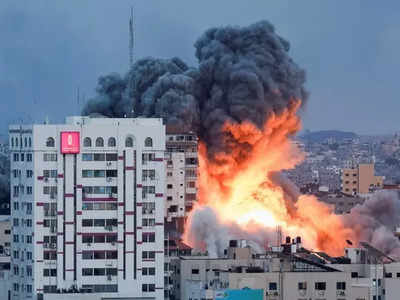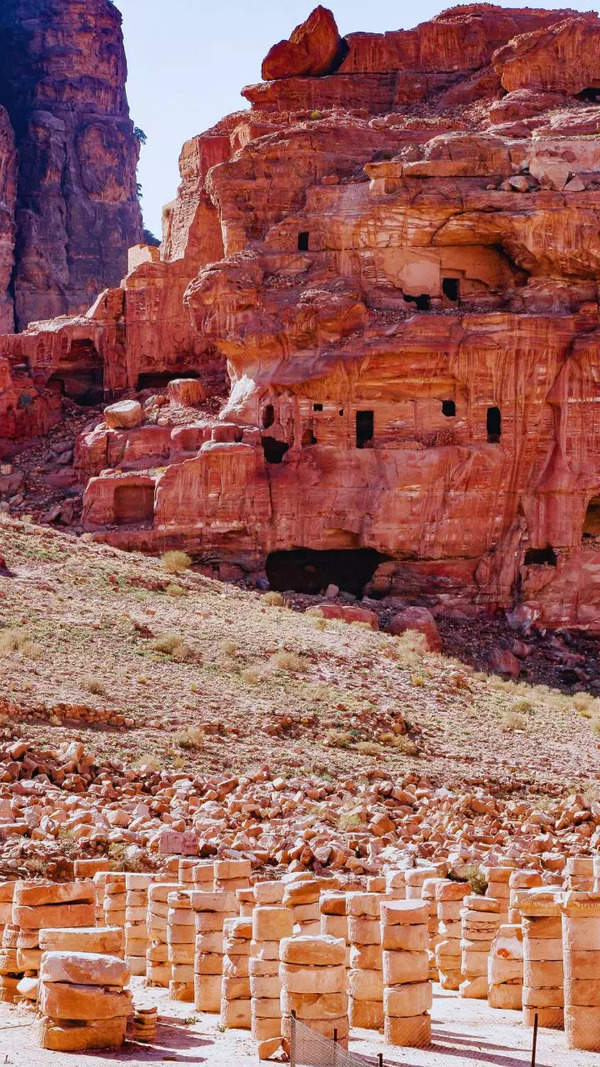- News
- World News
- Middle East News
- What is Hezbollah in Lebanon: Catalyst for Middle East war or path to peace?
Trending
What is Hezbollah in Lebanon: Catalyst for Middle East war or path to peace?
Israel and Hezbollah engaged in a tense exchange following Israel's assassination of Hezbollah commander Fuad Shukur. Preemptive strikes, rocket launches, and subsequent retaliations marked the conflict. Both sides claimed victories and emphasized avoidance of further escalation. Despite temporary de-escalation, the conflict remains unresolved, risking potential regional implications.

Israeli military strikes Hezbollah targets in Lebanon
The escalating conflict between Hezbollah and Israel has captured global attention as the risk of a wider Middle East war looms. For weeks, Israelis have been on edge, anticipating a major attack by Hezbollah in retaliation for Israel's assassination of a senior Hezbollah commander, Fuad Shukur, in Beirut last month.
For now, the recent strikes might serve to ease tensions temporarily, but the underlying conflict remains unresolved, with the potential to reignite at any moment.
This heightened tension has sparked widespread fears that a cross-border escalation could spiral into an all-out regional war.
A rapid cycle of retaliation
By breakfast time, both sides were already employing the language of containment. Hezbollah announced that it had completed the "first stage" of its retaliation for Shukur's assassination and seemed to be signaling a pause, at least for now. Israeli Defense Minister Yoav Gallant emphasized the importance of avoiding further regional escalation during his conversation with US Defense Secretary Lloyd Austin.
What is Hezbollah?
Hezbollah, a Shia Muslim organization, is a politically influential entity in Lebanon and controls the country’s most powerful armed force. Established in the early 1980s with support from Iran, Hezbollah was formed to counter Israel's occupation of southern Lebanon during the Lebanese civil war. Over the decades, it has grown into a major political and military force in Lebanon, participating in national elections since 1992 and maintaining a strong presence in the country’s politics.
Hezbollah's armed wing has a history of carrying out deadly attacks against Israeli and US forces in Lebanon. The group claims credit for Israel's withdrawal from Lebanon in 2000, portraying itself as a formidable resistance force. Hezbollah has since maintained thousands of fighters and amassed a vast missile arsenal in southern Lebanon, continuing its opposition to Israel’s presence in disputed border areas, as reported by BBC.
Hezbollah’s leadership and military power
Led by Sheikh Hassan Nasrallah since 1992, Hezbollah has been deeply intertwined with Iran, receiving funding and military support. Nasrallah, revered within Hezbollah, has become a central figure in the group's rise to power. Under his leadership, Hezbollah's military capabilities have expanded significantly. While Nasrallah claims the group has 100,000 fighters, independent estimates suggest a number between 20,000 and 50,000, many of whom are battle-hardened from the Syrian civil war, reported BBC.
Hezbollah’s military strength is unparalleled among non-state actors, with an estimated 120,000-200,000 rockets and missiles, including advanced guided missiles capable of striking deep inside Israel. This arsenal positions Hezbollah as a significant threat in the region, with capabilities far exceeding those of groups like Hamas in Gaza.
Recent escalations and Israeli response
Tensions between Hezbollah and Israel escalated dramatically on Sunday, as both sides traded heavy aerial attacks. Hezbollah launched a barrage of rockets in retaliation for the assassination of senior Hezbollah figure Fuad Shukr, who was killed on July 30. Hezbollah claimed to have fired 340 Katyusha rockets at Israel, though US officials reported a lower number. Israel responded with a massive airstrike, deploying over 100 jets to target Hezbollah positions in southern Lebanon.
Israeli Prime Minister Benjamin Netanyahu warned Hezbollah and Iran’s Supreme Leader Ayatollah Ali Khamenei that Israel’s actions were aimed at altering the balance of power along the Israeli-Lebanese border. “Israel is hitting Hezbollah with surprising, crushing blows,” Netanyahu stated, emphasizing that Israel's response was part of a broader strategy to secure its northern border.
The potential for regional impact
Despite the intensity of the recent exchanges, both Hezbollah and Israel have signaled that they do not seek a full-scale war in Lebanon. Some experts believe that these measured responses could lead to a temporary de-escalation of tensions, reducing the immediate risk of a broader conflict. Former Israeli Intelligence official Avi Melamed noted that the calibrated nature of Hezbollah’s retaliation indicates a desire to avoid triggering a larger war.
However, the situation remains volatile, with global concerns that the conflict could spill over into neighboring regions. The ongoing violence also complicates efforts to reach a ceasefire in Gaza, as negotiators in Cairo struggle to broker a truce between Israel and Hamas.
For now, the recent strikes might serve to ease tensions temporarily, but the underlying conflict remains unresolved, with the potential to reignite at any moment.
This heightened tension has sparked widespread fears that a cross-border escalation could spiral into an all-out regional war.
A rapid cycle of retaliation
Much of Israel woke up on Sunday to find that, at least for the immediate term, the feared attack seemed to be over almost before it began. Both Israel and Hezbollah quickly claimed victories of sorts. Israel boasted of its predawn preemptive strikes against thousands of Hezbollah's rocket launchers in southern Lebanon, while Hezbollah touted its subsequent rocket and drone barrages targeting northern Israel, which the Israeli military said resulted in the death of a naval officer.
By breakfast time, both sides were already employing the language of containment. Hezbollah announced that it had completed the "first stage" of its retaliation for Shukur's assassination and seemed to be signaling a pause, at least for now. Israeli Defense Minister Yoav Gallant emphasized the importance of avoiding further regional escalation during his conversation with US Defense Secretary Lloyd Austin.
What is Hezbollah?
Hezbollah, a Shia Muslim organization, is a politically influential entity in Lebanon and controls the country’s most powerful armed force. Established in the early 1980s with support from Iran, Hezbollah was formed to counter Israel's occupation of southern Lebanon during the Lebanese civil war. Over the decades, it has grown into a major political and military force in Lebanon, participating in national elections since 1992 and maintaining a strong presence in the country’s politics.
Hezbollah's armed wing has a history of carrying out deadly attacks against Israeli and US forces in Lebanon. The group claims credit for Israel's withdrawal from Lebanon in 2000, portraying itself as a formidable resistance force. Hezbollah has since maintained thousands of fighters and amassed a vast missile arsenal in southern Lebanon, continuing its opposition to Israel’s presence in disputed border areas, as reported by BBC.
Hezbollah’s leadership and military power
Led by Sheikh Hassan Nasrallah since 1992, Hezbollah has been deeply intertwined with Iran, receiving funding and military support. Nasrallah, revered within Hezbollah, has become a central figure in the group's rise to power. Under his leadership, Hezbollah's military capabilities have expanded significantly. While Nasrallah claims the group has 100,000 fighters, independent estimates suggest a number between 20,000 and 50,000, many of whom are battle-hardened from the Syrian civil war, reported BBC.
Hezbollah’s military strength is unparalleled among non-state actors, with an estimated 120,000-200,000 rockets and missiles, including advanced guided missiles capable of striking deep inside Israel. This arsenal positions Hezbollah as a significant threat in the region, with capabilities far exceeding those of groups like Hamas in Gaza.
Recent escalations and Israeli response
Tensions between Hezbollah and Israel escalated dramatically on Sunday, as both sides traded heavy aerial attacks. Hezbollah launched a barrage of rockets in retaliation for the assassination of senior Hezbollah figure Fuad Shukr, who was killed on July 30. Hezbollah claimed to have fired 340 Katyusha rockets at Israel, though US officials reported a lower number. Israel responded with a massive airstrike, deploying over 100 jets to target Hezbollah positions in southern Lebanon.
Israeli Prime Minister Benjamin Netanyahu warned Hezbollah and Iran’s Supreme Leader Ayatollah Ali Khamenei that Israel’s actions were aimed at altering the balance of power along the Israeli-Lebanese border. “Israel is hitting Hezbollah with surprising, crushing blows,” Netanyahu stated, emphasizing that Israel's response was part of a broader strategy to secure its northern border.
The potential for regional impact
Despite the intensity of the recent exchanges, both Hezbollah and Israel have signaled that they do not seek a full-scale war in Lebanon. Some experts believe that these measured responses could lead to a temporary de-escalation of tensions, reducing the immediate risk of a broader conflict. Former Israeli Intelligence official Avi Melamed noted that the calibrated nature of Hezbollah’s retaliation indicates a desire to avoid triggering a larger war.
However, the situation remains volatile, with global concerns that the conflict could spill over into neighboring regions. The ongoing violence also complicates efforts to reach a ceasefire in Gaza, as negotiators in Cairo struggle to broker a truce between Israel and Hamas.
End of Article
FOLLOW US ON SOCIAL MEDIA











